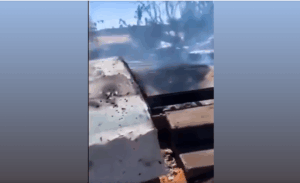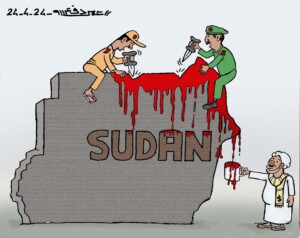Sudan analyst: Three scenarios for post-coup Sudan
Following the military coup d’état on October 25, and the signing of the political agreement between Lt Gen Abdelfattah El Burhan and PM Abdallah Hamdok on November 21, Sudan faces three possible scenarios, namely a continuation of military rule, a restoration of the civilian-led transition, or a complete collapse of the state, according to US-based Sudanese analyst in African affairs and a specialist in conflict areas Dr Suliman Baldo.
 Anti-coup demonstration in Khartoum on November 17 (Photo: Mosaab Hassouna)
Anti-coup demonstration in Khartoum on November 17 (Photo: Mosaab Hassouna)
Following the military coup d’état on October 25, and the signing of the political agreement between Lt Gen Abdelfattah El Burhan and PM Abdallah Hamdok on November 21, Sudan faces three possible scenarios, namely a continuation of military rule, a restoration of the civilian-led transition, or a complete collapse of the state, according to US-based Sudanese analyst in African affairs and a specialist in conflict areas Dr Suliman Baldo.
In an interview with Radio Dabanga, of which the second and final part will be broadcast today, Baldo says that the first scenario is the continuation of the coup in enabling itself in a real situation of an authoritarian, oppressive, dictatorial authority based on absolute oppression and murderous violence. And this, Baldo says, is the most likely possibility, meaning that the economic crisis will continue to deteriorate as a result of the suspension of its reforms and associated aid.
He added “If they succeed in this, they will have no choice but to practise absolute violence to suppress the protest movement rejecting them and to seek ineffectively to solve the problems of the economy, as the Bashir regime has been doing since 2011, after the Sudanese economy was bereaved of oil revenues”.
The analyst stated that the coup camp is working, through this scenario, to exercise real power in the state from behind the facade it presents to the world, which is the political agreement signed with Hamdok. Economic problems in an ineffective manner, as the Bashir regime has been doing since the year 2011. After the oil exit from the Sudanese economy, Baldo explained that this first scenario is the most likely and probable.
Civilian transition
Regarding the second scenario, Baldo clarified that this scenario is represented in the success of the civilian transitional government that Prime Minister Abdallah Hamdok will form in imposing its will and its decision on the coup camp, rejecting all decisions taken unilaterally by the putschists and restoring the matter to its rightful place with the precedence of the decision for the civilian component.
Baldo pointed out that this scenario is the least likely to happen despite Hamdok taking steps in this direction by cancelling all the decisions issued by El Burhan including appointing new undersecretaries to replace the undersecretaries appointed by El Burhan.
Collapse of state
Baldo clarified that the third scenario is the collapse of the state, the ‘Somali-isation’ of the situation in Sudan, the breakdown of the security and Rule of Law contract, and the transformation of matters into military confrontations between all civil and military components and militias.
But Baldo played down this scenario and said that the wisdom of the Sudanese people, their capabilities in finding solutions, and their legacy in mediation and initiatives, make it difficult for Sudan to collapse as a state, even though all the elements for the collapse of the state are present.
He ruled out a return to the partnership between civilians and the military, and told Radio Dabanga that the political forces refuse to return to the partnership with the military in its old form due to their loss of full confidence in the military component after the October 25 coup.
He explained that the best opportunity for the camp of rejection and the three no’s resisting the coup and its procedures, is to work on clarifying and gaining loyalty among the people for their perceptions so that they have a say.
Baldo said that the duty of the rejectionist camp is to define its political and economic visions for the post-transitional situation “if this is done by the domination of the military or by a solid stance of the civilian component in the available composition under the political agreement”.
Baldo sees that the rejection taking place in the street now has a chance to paralyse the capabilities of the coup camp in imposing its will and authority in ruling.
In this regard, Baldo encourages the Sudanese to continue to reject the military regime, but in various and varied forms. He added, “There must be a diverse and multi-form mass movement on a continuous basis with the development of tools to express rejection and paralyse the ability of the coup camp to consolidate the pillars of its rule in the country.”
He called on the leaders of the resistance committees leading this mass movement to think about the future about the forms of governance they would like for the country and to ensure the continuation of Sudan’s democratic transition under a fully legitimate civilian leadership.
In the first part of the interview, broadcast by Radio Dabanga yesterday, Baldo asserts that the controversial political agreement signed on November 21 by Gen Abdelfattah El Burhan, leader of the military junta that seized power in Sudan in a coup d’état on October 25, and Sudan’s Prime Minister Abdallah Hamdok, is “an intermediate stage that allows avoiding the worst effects of the coup, including bloodshed, international isolation, and Sudan’s return to its former pariah status in the international community”.
Listen to Part One of the interview on Radio Dabanga (in Arabic)

Dr Suliman Baldo is a Senior Policy Advisor for the Enough Project. He recently directed Sudan Democracy First Group, a Sudan-focused think tank aiming to help bring about faster democratisation and peace to the country.











 and then
and then